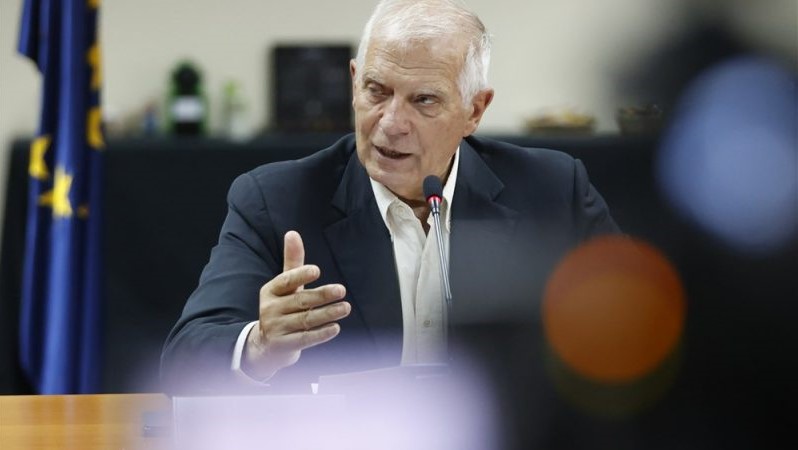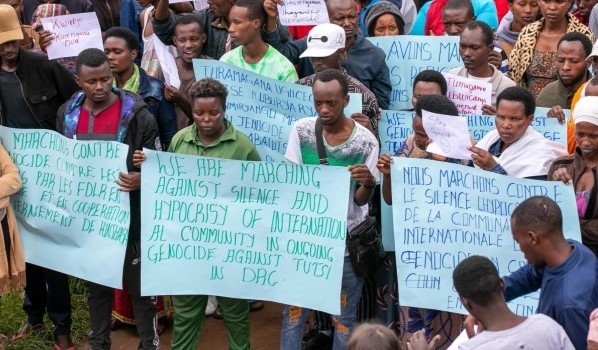Regional
West blaming Rwanda for DRC crisis smells hypocrisy

EU's chief diplomat Josep Borrell
Towards the end of December 2022, the European Union foreign
policy chief, Josep Borrell, said the EU had urged Rwanda to stop supporting
the M23 rebels in eastern DRC and use all its means to press the rebel
group to comply with decisions taken by the East African Community.
Around that same time, France and Germany openly
accused Rwanda of supporting the M23 rebels. The US also raised the same accusations
in what seemed like a coordinated conspiracy. Although the EU accused Rwanda of supporting the
M23, a claim Kigali denies, historians believe that the root cause of the
crisis in DRC was created by the same Western countries now shifting blame to
Rwanda, to become the sacrificial lamb.
Political analysts opine that if the
EU, particularly Germany, France, and Belgium, were sincere, they should
re-read their own historical role in the eastern DRC crisis. It is argued that
without the Berlin Conference of 1884-1885, which partitioned Africa among
European colonial powers, the eastern DRC crisis would not exist.
The
Berlin conference was also referred to as the Congo conference; because the
main point of discussion was to amicably divide resources among
the Western countries, at the expense of the African people. Congo’s vast resources were at the center of the
Conference, a position that has not changed until today within modern Europe.
It
would be naïve to expect the EU to propose lasting solutions to the root causes
of the crisis in eastern DRC when it is of their own making. The EU knows that the M23 rebels are not
Rwandans. European countries established the boundaries that created
Rwandophones on the Congolese side of the border.
France’s
role in the DRC crisis cannot be underestimated.
Operation
Turquoise was launched on June 23,
1994, during the genocide against the Tutsi. Although France claimed that the
deployment of its troops was to establish a "humanitarian protected
zone" in the Cyangugu-Kibuye-Gikongoro triangle, in south-western Rwanda, the
reality was different. France which
supported the then Rwandan genocidal government rushed to protect the defeated
army and Interahamwe militia who had committed genocide.
France, in collaboration with the Mobutu Sese
Seko regime, herded the defeated former Rwandan soldiers (ex-FAR) and
Interahamwe militia into refugee camps in DRC, then Zaïre. It was a breach of
international law for the UNHCR to allow armed elements in refugee camps.
In November 1994, some NGOs present in the camps
in Zaire called on the UN Security Council to deploy an international police
force to separate the refugees from those responsible for the genocide. The
appeal fell on deaf ears. Nothing was done to bring an end to the control
exercised by the génocidaires who had a strong grip on the aid pouring into the
camps and were, among others, forcefully recruiting to boost their fighting
force.
Inside the camps, the leaders of the refugees who were mostly diehards suspected of participating in the 1994 genocide, served as ‘intermediaries’ between the refugees and the aid organisations. They were officially assigned to draw up lists of beneficiaries and to organise distributions of food aid provided by the World Food Programme (WFP), much of which they misappropriated. They greatly exaggerated the number of aid recipients.
Form the camps, they launched attacks on Rwanda
in an attempt to continue the genocide. The EU and others watched in silence. The
mass murderers were emboldened. The remnants of the ex-FAR and Interahamwe
militia, mainly led by FDLR, have for nearly three decades spread genocide
ideology in eastern DRC. They joined hands with Kinshasa to discriminate and
kill Rwandophones, with impunity.
The M23 rebels are fighting to end this injustice
which targets their own people who are legitimate Congolese. The DRC crisis is
an internal political problem that should be solved through political means.
Unfortunately, instead of calling Kinshasa to
order and supporting the mediation process to end the decades’ long crisis, Western
countries are only concerned by their own interests. The EU's motives at the
Berlin Conference, more than a century ago, are still the same today.
On February 5,
1885, Belgian King Leopold II established the Congo Free State by
brutally seizing the country as his private property. He was responsible for widespread
atrocities committed against the Congolese. His actions resulted into the death
of an estimated 10 million people.
Belgian scholar Jules Marchal estimated that Leopold II drew
some 220 million francs (or $1.1 billion in today's dollars) in profits from
the Congo during his lifetime. Ever since, Westerners’
greed for DRC’s resources never ceased. It is the reason why Belgium has to
make sure it is in DRC’s good books by always supporting even wrong political
decisions.
Belgium, through the colonial divide and rule
policy, introduced the ‘race’ classification which resulted into discrimination
against the Tutsi in the Great Lakes Region.
Belgian colonialists put forward a discriminatory
theory that classified the Tutsi as foreigners in the Great Lakes region.
The ethnic classification introduced in Rwanda in
1926, a tool known as the Vernir Caliper
which was used to measure the size of noses as criteria to determine a person’s
ethnicity. Today, while persecuting Rwandophones in DRC, the size of the nose
and facial appearance are the guiding features to identify those to be killed
and those who should be spared.
The discriminatory and divisive policies introduced by colonialists
inform the genesis of the crisis we see today in eastern DRC. The EU and other Western
powers care about their selfish interests. They are less concerned with the
lives of people being killed.







